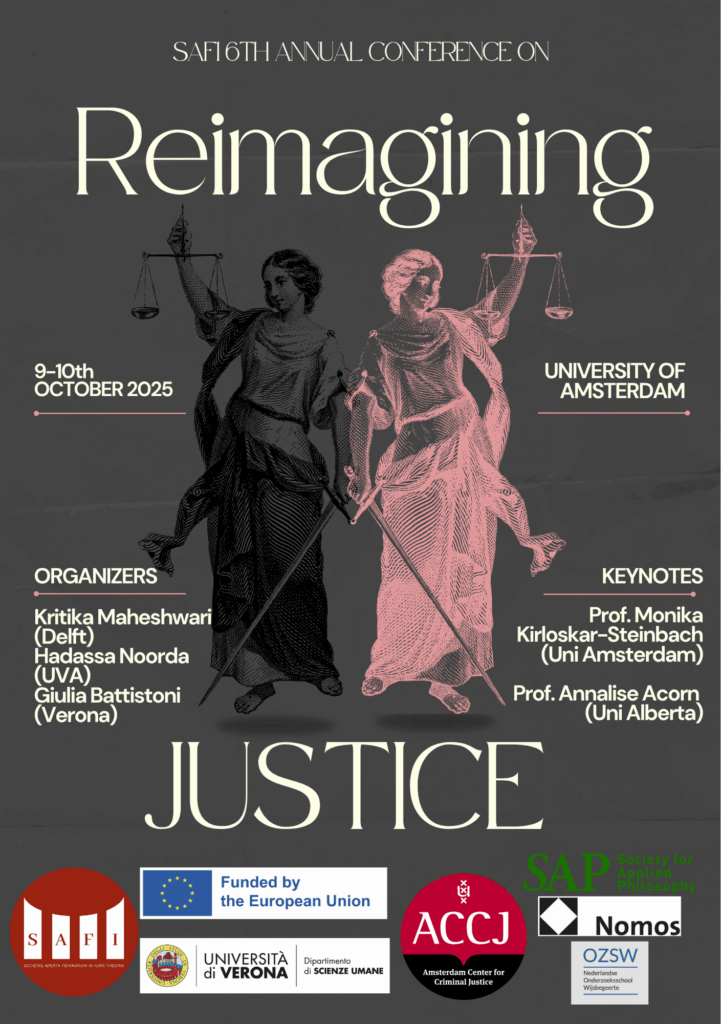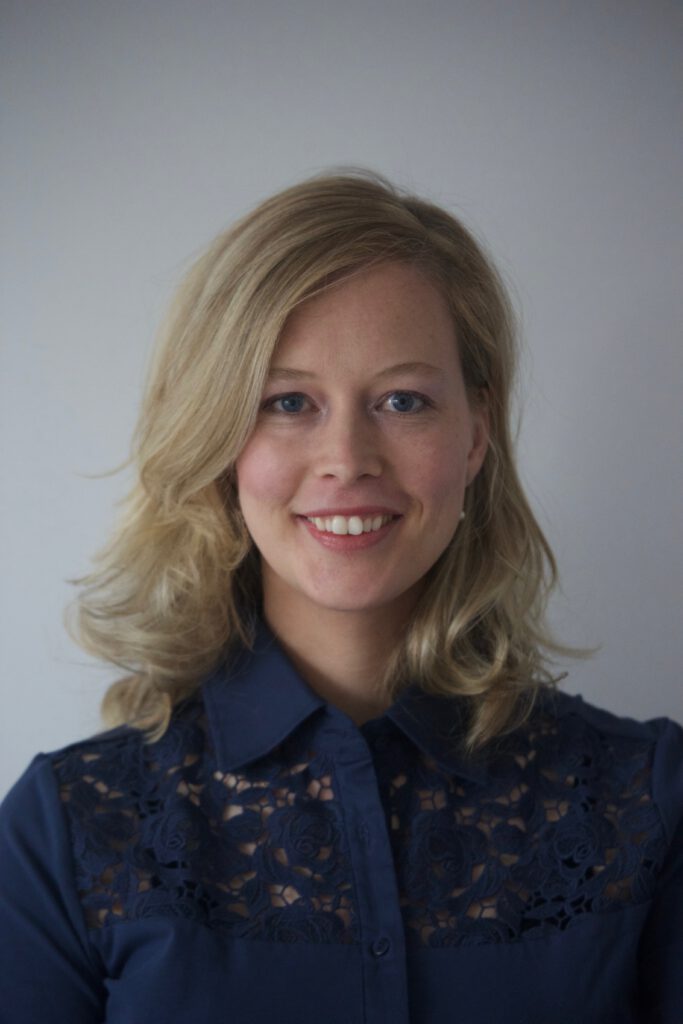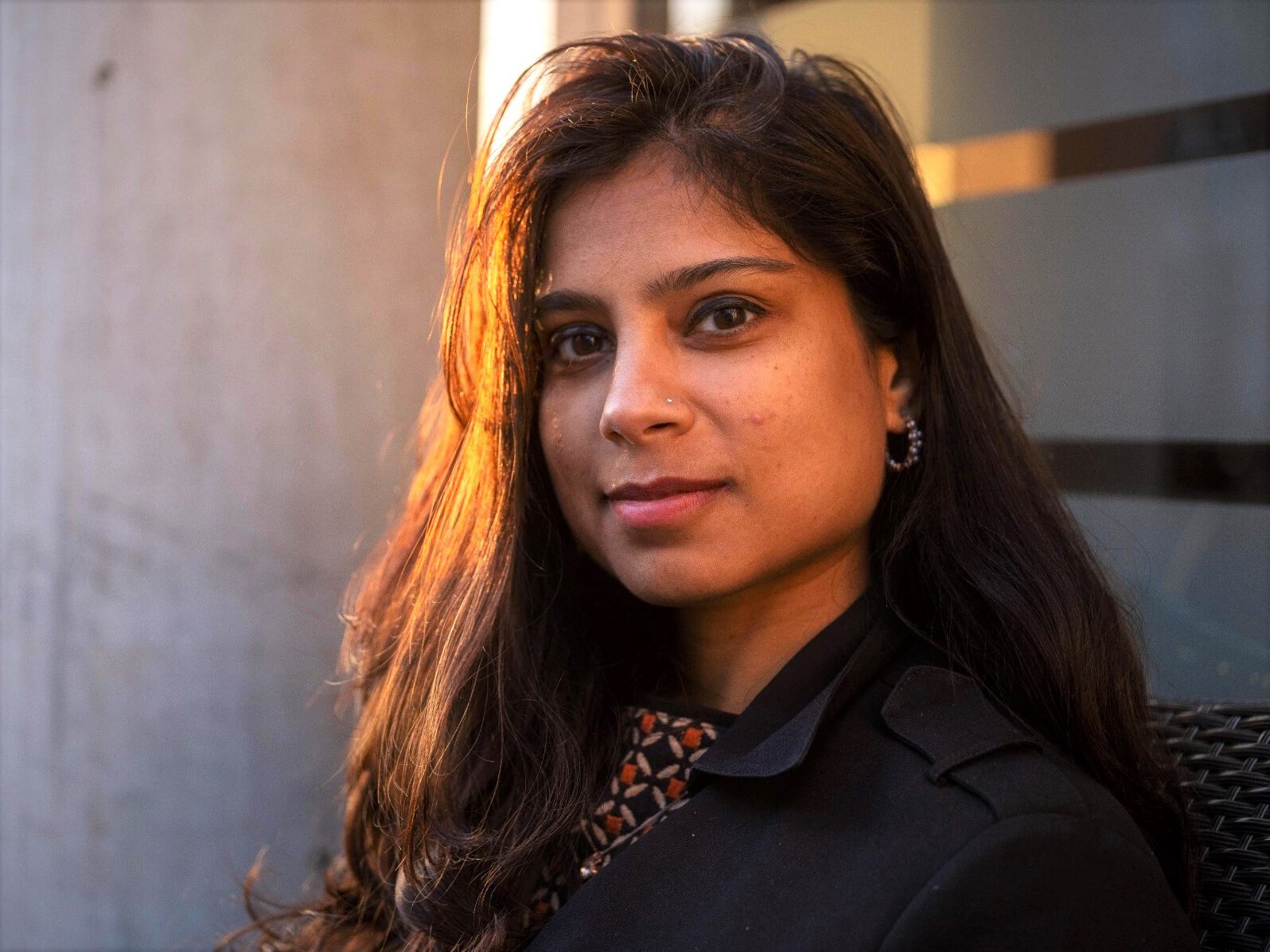Reimagining Justice
SAFI’s 6th annual conference
9th-10th October 2025 at
the University of Amsterdam (Netherlands)
nIEUWE AchteRGRACHT 166, 1018WV Amsterdam
We are pleased to announce our keynote speakers for this year: Prof. Monika Kirloskar-Steinbach (Vrije Universiteit Amsterdam) and Prof. Annalise Acorn (University of Alberta).
The deadline for submitting an abstract is now closed.
Programme:
Description
Justice has long served as a cornerstone of both philosophical inquiry and legal practice. Historically, it has been interwoven with the evolution of legal systems that seek to enforce order through punitive measures. Yet, as classical theorists and modern critics have observed, the mechanisms of punishment often reveal a disjunction between the law’s outward appearance and the deeper, more abstract notion of justice. Thinkers such as Arendt have argued that while law can be deconstructed and critiqued, justice remains an ever-receding horizon—an ideal that cannot be fully captured by rigid legal norms. This tension compels us to ask: How can justice be realized when legal practices and legislative frameworks, often imbued with coercive power, fall short of encompassing the moral imperatives they claim to uphold?
Central to this inquiry is the role of justice in legal decision-making and the individuals who shape it—judges, lawmakers, prosecutors, and legal scholars. Their interpretations of justice influence how laws are crafted, enforced, and challenged. Yet, these decisions are shaped by institutional norms, political pressures, and personal biases. The dominance of retributive justice in legal systems has long favored punitive responses, often at the expense of more nuanced and restorative approaches. These frameworks, while aiming for order and deterrence, frequently neglect the finer nuances of individual standpoints, and the complex interplay of responsibility and systemic harms within legal structures.
Another key dimension involves the intersection of justice with power, race, and gender within legal structures. The state’s monopoly on legitimate force underpins many legal practices, yet this authority often obscures the inherent violence of judicial processes. From harsh sentencing laws to the structural coercion embedded in policing and incarceration, power dynamics determine who is granted access to justice and who is excluded. Historically, marginalized communities—especially along racial and gender lines—have been disproportionately subjected to legal scrutiny, punishment, and systemic exclusion. The composition of legal decision-makers further influences these outcomes: whose perspectives shape legal norms, and whose experiences remain overlooked in judicial reasoning?
Contemporary crises further complicate the legitimacy of legal authority and the extent to which it contributes to—or detracts from—a just society. For instance, the ongoing migration crisis across Europe and beyond forces us to confront the realities of displaced populations seeking refuge from conflict, persecution, and economic hardship. Similarly, the legacy of genocide—whether reflecting on the historical scars or more recent mass atrocities—continues to shape debates over reparative justice, collective responsibility, and reconciliation? Meanwhile, technological breakthroughs that claim to offer innovative and efficient tools for crime prediction, evidence gathering, monitoring compliance with international human rights standards risk reinforcing biases and eroding judicial discretion, particularly in ways that disproportionately affect already marginalized groups.

Speakers will have 20 minutes to present their paper, and we will allow time for discussion. Pre-circulation of full papers is encouraged but not required.
To support the organization of the conference, we kindly ask participants to contribute €100 to cover for the expenses.
However, we are aware that not all early-career scholars can avail funding for conference participation from their institutions. If you do not have access to funding, please reach out to us and we will explore possibilities for a waiver. Funding permitting, we aim to offer small bursaries for dependent care in order to enable participants with caring responsibilities to attend.
To REGISTER and to receive the PAYMENT DETAILS, please send an email to saficonference2025@gmail.com.
CONTACT US
For questions, please contact the organisers, Hadassa Noorda (University of Amsterdam) and Kritika Maheshwari (TU Delft) at saficonference2025@gmail.com.

Dr Hadassa Noorda is an Associate Professor at the University of Amsterdam, where she specializes in the philosophy of law, with a particular focus on the philosophy of criminal law. Her research has been published in leading academic journals, including the Modern Law Review, Criminal Law and Philosophy and the European Labour Law Journal. Hadassa holds degrees in both law and philosophy from the University of Amsterdam and Columbia University (LL.B., LL.M., BA, MA, PhD). She was a Dworkin Balzan Postdoctoral Fellow and a Postdoctoral Global Hauser Fellow at NYU, where she worked under the supervision of Jeremy Waldron and Liam Murphy. Additionally, she has been a research fellow at Columbia Law School. She received a Rubicon grant from the Netherlands Organisation for Scientific Research (NWO), and in 2023-2024, she was an Institute Gak Fellow at the Netherlands Institute for Advanced Study (NIAS).

Kritika Maheshwari is an Assistant Professor at TU Delft (Netherlands), working at the intersection of moral, political, and legal philosophy. She was previously a visiting research fellow at Rutgers Institute for Law and Philosophy. Her current projects explore the relationship between risks, wrongs, and compensation, the ethics and politics of automated decision-making in legal contexts, and the practice of academic spousal hiring. She is also the ambassador for the Netherlands Chapter of SAFI.
Coordination and oversight: Giulia Battistoni (University of Verona), SAFI President.

Giulia Battistoni is Marie Skłodowska-Curie Post-Doctoral Global Fellow (project: “Collective Responsibility Towards Nature and Future Generations”) at the University of Verona. She was previously Post-Doc Research Fellow at the Istituto Italiano per gli Studi Storici (2021/2022); at the University of Verona (2019/2021); at the Istituto Italiano per gli Studi Filosofici (2019). Her main research interests include Classical German Philosophy, in particular the question of responsibility and imputation. She was visiting research fellow at Boston University (2023/24), at the University of Illinois at Chicago (2018) and at the Hegel-Archiv at the Ruhr-Universität Bochum (2016; 2017).
The event is also conceived as a dissemination opportunity for the results of the ReNa project – Collective Responsibility Towards Nature and Future Generations – funded by the European Commission and led by Dr. Giulia Battistoni. A dedicated dissemination session is planned following the annual SAFI meeting, as the project will come to its conclusion in October 2025 (Link to the Project: https://www.phil-responsibility.com).
With gratitude for the generous support of the following institutions:


